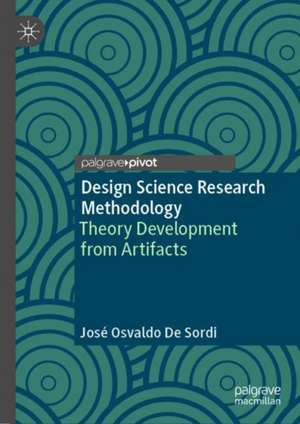Design Science Research Methodology: Theory Development from Artifacts
Autor José Osvaldo De Sordien Limba Engleză Hardback – 3 sep 2021
Design Science Research Methodology offers researchers in a variety of disciplines an examination of the various phases of scientific research development and communication.
Preț: 484.85 lei
Nou
Puncte Express: 727
Preț estimativ în valută:
92.77€ • 96.86$ • 76.78£
92.77€ • 96.86$ • 76.78£
Carte tipărită la comandă
Livrare economică 04-18 aprilie
Preluare comenzi: 021 569.72.76
Specificații
ISBN-13: 9783030821555
ISBN-10: 3030821552
Pagini: 93
Ilustrații: XVII, 146 p. 5 illus., 3 illus. in color.
Dimensiuni: 148 x 210 mm
Greutate: 0.35 kg
Ediția:1st ed. 2021
Editura: Springer International Publishing
Colecția Palgrave Macmillan
Locul publicării:Cham, Switzerland
ISBN-10: 3030821552
Pagini: 93
Ilustrații: XVII, 146 p. 5 illus., 3 illus. in color.
Dimensiuni: 148 x 210 mm
Greutate: 0.35 kg
Ediția:1st ed. 2021
Editura: Springer International Publishing
Colecția Palgrave Macmillan
Locul publicării:Cham, Switzerland
Cuprins
Chapter 1:-DSR as an innovation accelerator strategy.- Chapter 2:-Core Concepts of DSR.- Chapter 3:-Types of artifacts or knowledge generated by DSR.- Chapter 4:-DSR from the perspectives of different areas or professional schools.- Chapter 5:-Design Science Research Method.- Chapter 6:-Theory Development from Artifacts.- Chapter 7:-Variations of the DSR approach.- Chapter 8:-Communication of the results of the DSR survey.
Notă biografică
José Osvaldo De Sordi is Lecturer-researcher of the PhD Program in Administration at Centro Universitário Campo Limpo Paulista (UNIFACCAMP), Brazil and Professor of the Administration course at Federal University of São Paulo (UNIFESP), Brazil. He has published 10 books, two of them focused on the development of scientific research.
Textul de pe ultima copertă
This book addresses the science of artificial and design theory in the context of the scientific research development environment. The author discusses the concepts, activities and techniques associated with the emerging methodology Design Science Research (DSR). Further, he examines the main challenges for its implementation, based on an analysis of the DSR literature, variations of DSR (i.e. Action Design Research, and Grounded Design), and the applicability of DSR in various disciplines related to innovation, both within and outside of the professional school. As a result, this book goes beyond conceptual issues of DSR, presenting and discussing more pragmatic issues and challenges faced by researchers.
Design Science Research Methodology offers researchers in a variety of disciplines an examination of the various phases of scientific research development and communication.
José Osvaldo De Sordi is Lecturer/Researcher of the PhD Program in Administration at Centro Universitário Campo Limpo Paulista (UNIFACCAMP), Brazil and Professor of the Administration course at Federal University of São Paulo (UNIFESP), Brazil. He has published 10 books, two of them focused on the development of scientific research.
This book is a translation of an original Portuguese edition. The translation was done with the help of artificial intelligence (machine translation by the service DeepL.com). A subsequent human revision was done primarily in terms of content, so that the book will read stylistically differently from a conventional translation.
Design Science Research Methodology offers researchers in a variety of disciplines an examination of the various phases of scientific research development and communication.
José Osvaldo De Sordi is Lecturer/Researcher of the PhD Program in Administration at Centro Universitário Campo Limpo Paulista (UNIFACCAMP), Brazil and Professor of the Administration course at Federal University of São Paulo (UNIFESP), Brazil. He has published 10 books, two of them focused on the development of scientific research.
This book is a translation of an original Portuguese edition. The translation was done with the help of artificial intelligence (machine translation by the service DeepL.com). A subsequent human revision was done primarily in terms of content, so that the book will read stylistically differently from a conventional translation.
Caracteristici
Explores the concepts, activities, and techniques that constitute the DSR research method Addresses the challenges in each phase of the development of scientific research and how they can be overcome Highlights new avenues for continuing DSR research
